
By Chris sammons

Mythical Beasts in Year 3


By Chris sammons

Mythical Beasts in Year 3
Chris Sammons, Head of School
Amission is the reason for getting up each morning. For us here, to ensure that students of different nationalities grow to their full potential as independent learners in a caring community.
Well done to the Secondary team who have supported the first ever cohort of six learners in our IB Careers Programme. They are making great progress in their new course. The IBCP Arts Pathway allows students to spend more time and specialise in a particular area of interest. It also allows flexibility to blend different types of learning and assessment together. Our students shared their enjoyment of the course and the outcomes of their learning recently with the Board; what a pleasure to see fine art, fashion, marketing and film being produced by students in response to the same brief. This course is really allowing students to reach their full potential by building on individual passions and the care taken by their secondary teachers to support each learner is exemplary. Look out for the Business Specialist pathway about to launch next August!
Shout out to the Cross Campus team who have also continued to provide new sporting activities in an environment of opportunity and care. This included a change in venue for welcoming SEASAC footballers elevating the professional feel for learners across the region. Their care is also shown through the addition of Netball in our seasonal sports programme – a new and additional chance to shine.
The Cross Campus team also lead and oversee teacher training which has seen several firsts this term. Following a visit by Andrew Mowat in October, some Year 1 learners have been comparing their written stories to ones produced by AI developing rich discussions and early understanding of this new technology. In Secondary, History students have learned how to use AI in creating original thinking to aid memory recall. Throughout the school our children are in safe hands neither lagging behind nor rushing ahead, developing in balance with the changing technology of our world.
The Primary team have also been living the mission with a focus aligning literacy and writing development across Year groups. It was a pleasure this week to walk from Nursery who were folding shapes and developing their fine motor skills to Foundation Stage who were air-play -

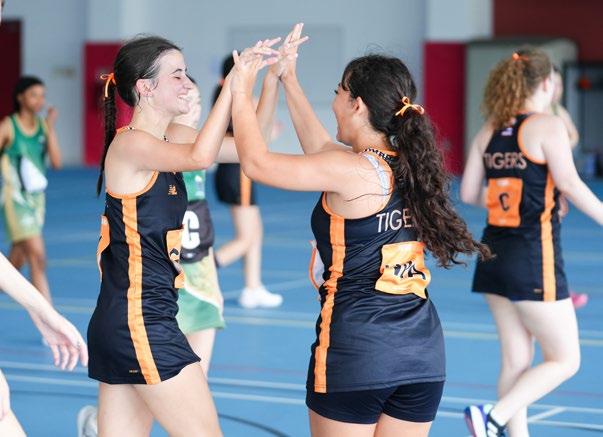


ing with letters. To move between early imaginative and descriptive writing in Year 1 to themed writing about mythical beasts in Year 3 (well done Year 3 for your cursive skills!), then filmed presentations in Year 6; what a great way to understand how a child develops and grows language through a well-planned curriculum.
Without knowing it, teachers take oaths in their heads and hearts when they come to work here. They strive hard to honour the mission through their intentional planning, the support they give beyond the school day and the new initiatives the incorporate into daily practice. It is a demand-
ing and rewarding role. I know that each parent will have an example of commitment from our staff and students. This unwavering commitment ensures that Bangkok Patana School continues to be a place where students can grow to their full potential as independent learners.
Thank you to the partnership that is created by you all and we look forward to connecting with you at the Christmas celebration on Wednesday. Have a well-earned break this Christmas, you have earned it after such a great first term.
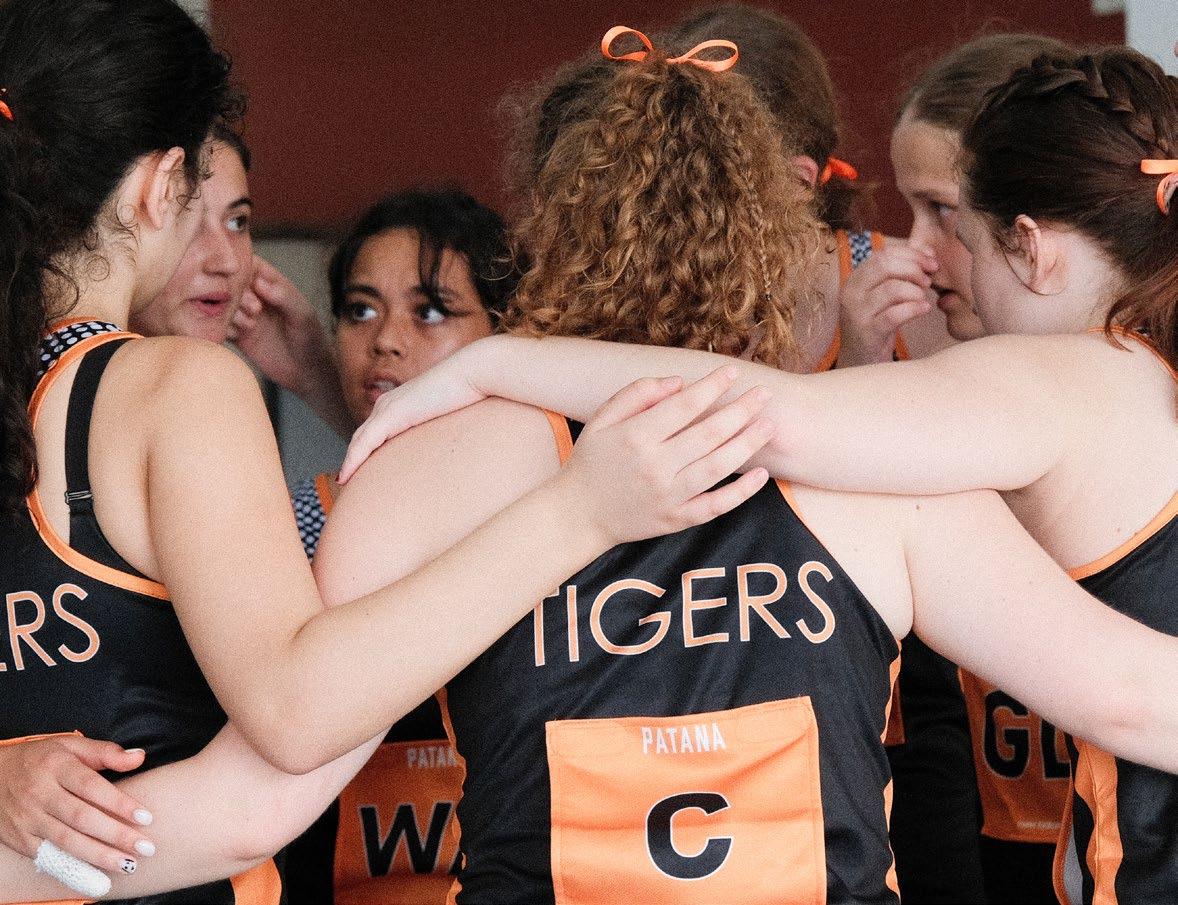

Friday, 13th December is a Non-Uniform Day. Students are encouraged to dress up in their Christmas attire.
SCHOOL PHOTOS WILL TAKE PLACE EARLY IN TERM 1:
Primary School photos: 13th – 22nd January
Secondary School photos: 23rd – 31st January
This year school photos will be taken by Sunshine Photo. Under the agreement, all photos will be stored by Sunshine for 1 year and then all files will be deleted to comply with PDPA guidelines. Sunshine offers a large variety of products, which they will detail when the student proofs are sent home.
School photos taken in Term 2 will be used on all school databases and on report cards, etc. from Term 3 of this academic year through to the end of Term 2 of the next academic year.
Your child’s class teacher/tutor will let the students know when their class photo is scheduled. Class photos are taken with students and their teachers, parents are not allowed into the photo room.
If your child misses their class photo, they will not be digitally added into the group photo. In the Yearbook, we will add a separate photo of the missing child beside the group photo.
IF
If you know ahead of time that your child will not be present for their photo, please inform their class teacher/ tutor so that an alternate day for their photo can be arranged.
Primary: If your child misses their photo day, please contact their class teacher to ensure your child goes to the photo location within 31st January to have their individual photos taken. No appointment is necessary during school hours. The student will need to show their Patana card (Years 3 – 13), or be accompanied by an adult.
Secondary: Students should head to the photo room to have their photo taken, immediately upon returning to school. No appointment is necessary. They should have their Patana card with them.
Catch Up Day: A catch-up day will be scheduled and communicated via the Secondary Daily Notices and Primary Class Teachers. Students who were unable to get their photo taken during the three initial weeks of scheduled school photos, should get their photo taken on this day.
*Appointments for family photos can be requested by sending an email to publish@patana.ac.th along with your childrens class details. requests will be considered on a first come first serve basis.
QUESTIONS?
Email publish@patana.ac.th
*Text amended with updated information. The School Shop and Post Office will be closed from 16th December 2024, and will reopen on 6th January 2025.
If you require documentation from the School to support visa applications or extensions over the Christmas break, please request this as soon as possible.
Please complete the request form via the Parents’ Gateway allowing 3 working days : Document Request from Admissions (patana.ac.th)
Please note that the last date to submit requests this term will be Monday 9th December 2024. Requests received after this date will be processed from 6th January 2025 onwards.
If you have any questions, please contact parg@patana.ac.th



Researchers have identified that a basic human need is the feeling of belonging. Those that feel they ‘belong’ are healthier, are motivated to achieve, and more successful. Scientists define belonging as a feeling of being accepted for who you are, and feeling you are an integral part of some purpose. In other words, a feeling that what you do matters to others and that they appreciate you for who you are. Many of us feel belonging in our families, but researchers say feeling a sense of belonging at school will help students be more confident, make social connections, and improve their academic work. For some students, feeling they belong and making connections with others comes naturally, for others, it’s a challenge. And for students who may be neurodivergent, it can be especially difficult.
Neurodiversity, a term first coined by researcher and author Judy Singer, and explored in her book Neurodiversity: The Birth of an Idea, has helped change the perception that everyone experiences the world in the same
way. She emphasizes that our differences are part of the countless ways that the human brain is wired, and that this inherent variability is something to be celebrated. All of us are unique, but for some students, their brains may work in such dissimilar ways that the school environment can be overwhelming. Students with Autism Spectrum Disorder (ASD), ADHD, or a Specific Learning Disorder (SLD), like Dyslexia, may learn in very diverse ways. By embracing our values to be Kind, Safe and Curious we can create a sense of belonging for all of our students.
One of the ways we are able to support Primary School students is by offering them a weekly friendship and/or social communication group, as needed. During these smaller group lessons, students are able to develop skills such as forming friendships, managing conflicts and compromising. Depending on the group, lessons may also incorporate some of the ‘Social Thinking’ concepts such as ‘thoughts and feelings’, ‘hidden rules and expected-un-
expected behaviours’ and ‘size of the problem’. Here are some ideas for supporting your child at home:
· Try playing turn taking games to help develop skills such as waiting, turn taking etc.
· Give opportunities for your child to play and interact with their peers.
· Label your own emotions and the feelings of others. For example, “she’s sad because she’s lost her toy”.
· Talk to your child about difficult situations (what they could say or do).
· Consider using Comic Strip Conversations to help discuss situations, feelings and possible solutions. Please see the following link for more information: https:// www.autism.org.uk/advice-and-guidance/topics/ communication/communication-tools/social-stories-and-comic-strip-coversations
We are moving towards a more social model of inclusion, one focusing on how the environment affects individuals rather than assuming the issue lies with the child. Instead of using a one-size-fits-all approach, we now understand the need to adapt the learning environment so all children can feel safe and succeed. For example, this might include providing quiet spaces for children who struggle with sensory overload. Or offering visual timetables and resources for those who benefit from more structure. Class teachers and the Support for Learning department work together to help children with self-regulation strategies and tools so they can become more resilient when faced with challenges. Assistive technology is available for children with communication needs so their thoughts are more easily expressed. By identifying each child’s specific needs and looking beyond labels, we try to create an environment
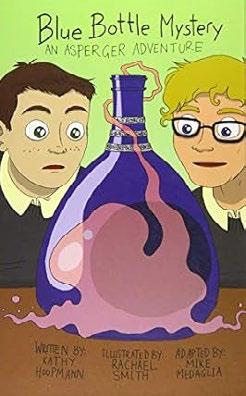

where every learner feels supported and included. This model benefits all since when students feel secure in their routines and comfortable communicating, they feel safe and part of a community that values their contributions.
The beauty of the Patana community is its diversity. Being curious about cultures, personalities and individual talents of people in our school starts conversations that can bring us closer together. Our wonderful library has a large collection of materials to support learning, and understanding, about how we may be similar to others, or very different.
For Key Stage 1 students, The Colour Monster by Anna Llenas helps students learn to talk about their feelings and how their feelings might not be the same as others.
Red: A Crayon’s Story by Michael Hall is about a red crayon that no matter how hard he tries, can never colour things red; they only turn out blue. It’s a tale about learning to be true to yourself and to follow your own path despite obstacles.
For older students, The Blue Bottle Mystery by Kathy Hoopman both the novel and graphic novel adaptation offer insight into how the main character Ben, a boy diagnosed with Asperger’s (a term once used to describe ASD), may think and understand differently from his family and friends while solving an exciting mystery.
Please reach out to the librarians for additional book recommendations on neurodiversity and stories that celebrate differences for you to share at home.
Having conversations with your children and discussing differences, builds empathy and an understanding that each of us has our own unique strengths and challenges. In our school, we all have something valuable to offer and are important to our community. We all belong at Patana.



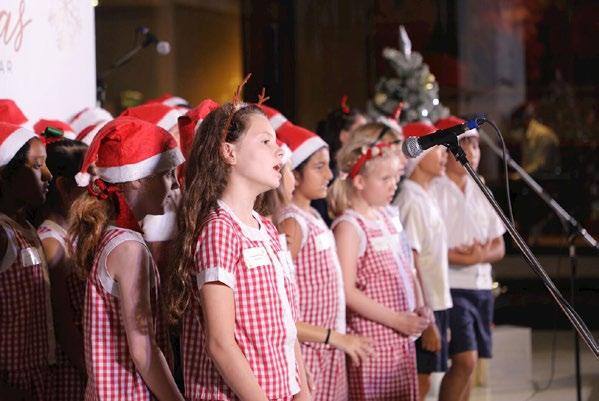
We were excited and honoured to be invited to perform at Bumrungrad International Hospital on Monday, as part of their Carol singing event. It was a wonderful opportunity to spread some festive cheer to inpatients and their families with a selection of Christmas-themed songs. This concert was the first time our Year 5/6 choir had performed to the public this academic year, and it was especially lovely to see so many parents supporting and attending the concert. We’re looking for -
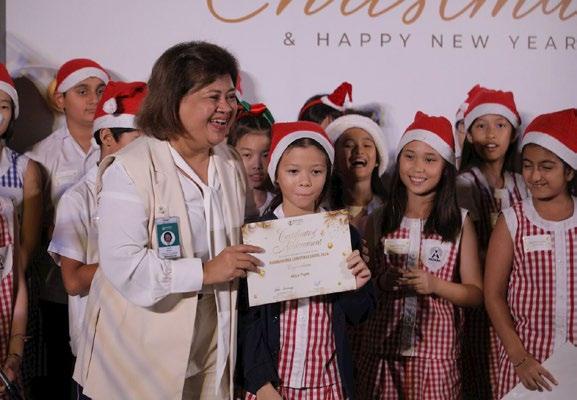
ward to future collaborations with the hospital and more performance opportunities outside of school too.
This concert also marked the start of our busy Christmas season in the music department. We hope you’ll join us for one of our upcoming events over the next two weeks, including the Year 1/2 Christmas Singalong this Friday, as well as our cross-campus Christmas concerts and assemblies next week.

DrDelaney sits down with acclaimed developmental psychologist David Yeager, Ph.D., to discuss his groundbreaking book, 10 to 25: The Science of Motivating Young People. Together, they delve into the transformative power of adopting a mentor mindset to simplify parenting — especially when tackling tech time challenges. Use the timestamps below to jump to a section that resonates with you.

Timestamps
00:00 Introduction to the Screenagers Podcast
00:23 Meet David Yeager: Growth Mindset and Mentor Mindset
02:34 The Mentor’s Dilemma: Balancing Criticism and Support
04:23 Wise Feedback: The Key to Motivating Youth
10:17 Transparency and Benevolent Intentions
12:45 Understanding Adolescent Motivation: Status and Respect
17:42 The Role of Testosterone in Adolescent Development
20:47 Respectful Communication: The Vegemite Experiment
24:15 Testosterone and Behaviour
25:50 Parenting Challenges and Mentor Mindset
27:04 The Science of Nagging
29:25 Effective Communication with Teens
32:45 Collaborative Troubleshooting
34:41 Balancing Screen Time and Life Goals
36:53 The Enforcer vs. Mentor Mindset
41:30 Concluding Thoughts and Resources
Have a great weekend.
Brian Taylor
Assistant Principal, Technology for Learning
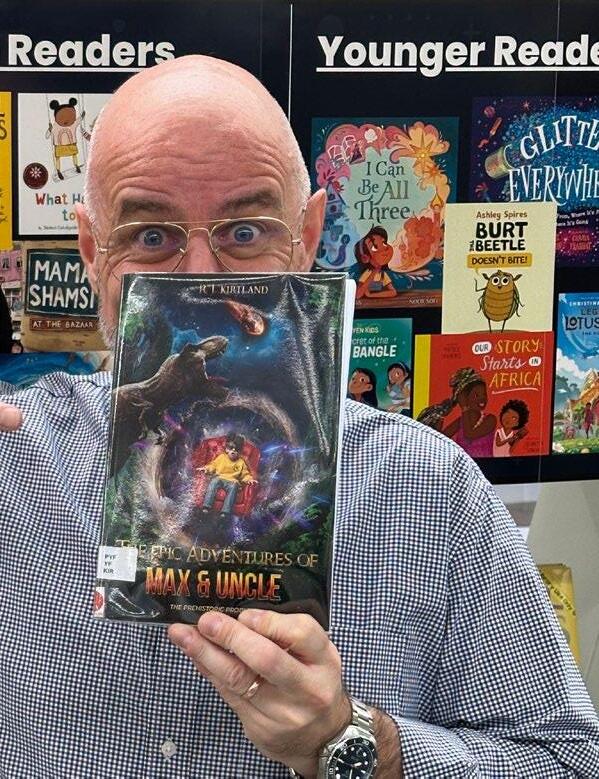
The Teachers as Arts Practitioners (TAPs) Artist Spotlight series offers a glimpse into the artistic journeys of staff participating in the TAPs Continued Professional Learning (CPL) programme. In this edition, I speak with Rick Kirtland, Assistant Principal Inclusion and Welfare in the Primary school, and author of The Epic Adventures of Max & Uncle: The Prehistoric Problem. Richard shares his inspiration, creative process, and how his experiences as an educator influence his storytelling. Rick will be reading extracts from his new book live at the TAPs exhibition launch party on Friday, 31st January, between 3:00–6:00 pm. Audiences can enjoy live performances and explore the artworks in the exhibition, Patana Canvases: Unveiling the Artistic Practices of Our Community, which will run from Wednesday, 29th January, to Friday, 7th February 2025. The exhibition features an inspiring showcase of works by over 30 academic and business staff members from across the school.
1. Tell us about your creative hobbies and passions out-

side of school.
In terms of creative hobbies and passions outside of school, it’s got to be writing really. Of course, I love reading, too. I’ll read pretty much anything (although, I’m not a great fan of romance, dystopian drama). My favourite genres are probably thrillers or decent and authentic historical fiction.
2. You have recently published a new book, The Epic Adventures of Max & Uncle: The Prehistoric Problem. Could you tell us about the book and what inspired you to write it?
I’ve always been interested in art and in writing. As a kid I was always drawing (on myself!) or writing something – usually just little excerpts from narratives or ideas that popped up in my mind. Only later, when I was at university, did I take writing more seriously, as I started writing lyrics for the band I was in. They were pretty terrible, to be honest! And the name of the band was no better: Man
Bites Dog. A few years later, while studying again at university, this time for my PGCE, we were asked to write the beginning of a story which involved a young protagonist – and that is when The Epic Adventures of Max & Uncle was actually born. However, I didn’t come back to it until decades later, when I rediscovered it and decided to write it out in full.
3. Max is a mischievous and kind-hearted character. How did you develop his personality, and why do you think readers will connect with him?
Well, Max is something of an archetype – the stereotypical mischievous boy who is always underperforming, always dancing on the edge of disaster and usually just about wily enough to scrape through. Most children, and adults, can identify with this type of character, as most of us have been to school with someone similar. Perhaps we were a child like Max ourselves! (Not me, of course; I was always positively angelic) The book is written in the first-person, from Max’s perspective, which helps to draw readers in and feel as if they are standing in Max’s shoes (although Max loses his shoes half way through the book).
4. Several characters in your book draw inspiration from real life. How did your personal experiences shape these characters, and what do you hope readers will take away from them?
There are actually only a small number of characters in the book, Max and his uncle being the main ones. As we have already discussed Max, we can talk a little about his ‘mad’ Uncle Malcolm, who is loosely based on my own uncle. There are various aspects of Uncle Malcolm’s home and character that resonate with my real life experiences. For example, the constant half-light inside the house with the curtains half drawn; the soggy sandwiches; the heating always turned up, even in summer, and the windows left open; the continual pipe smoking; the constant presence of cats… While my own uncle wasn’t a crazy inventor he was… how does one put it politely? Bonkers.
5. What does your writing process look like, and how do you balance it with your role as an Assistant Principal? Do you have a specific routine or practice that helps you stay creative and motivated as a writer?
Well, I don’t really have a strategy or routine. Perhaps if I was writing full time I would need to, but for now, I just write whenever I can. I always seem to be motivated to write children’s stories and never seem to have a problem creating the ideas. The issue is having enough time to write them all down properly given all the other competing de -
mands in life! Let’s just say, I have more ideas for different books that I am hoping I will finally manage to manifest in future.
6. What has been the most rewarding part of seeing your book come to life and sharing it with readers?
The most rewarding part is hearing how much children enjoy the story. Simple. It’s great when a child tells you their favourite part and you think, Yes! So it DID work the way I wanted it to! I guess that’s very satisfying, as you never really know how well a story will land until you release it into the wild.
7. How has your professional background as an educator influenced your perspective on writing for children and the themes you explore?
I don’t really know, to be honest. The privilege of working with children certainly gives us incredible daily insights into how they perceive things, what they like, and what they find funny, which is important. I guess I’ve been teaching so long that I – like so many of us in this field – understand what makes children tick. The Epic Adventures of Max & Uncle doesn’t even pretend to deal with any specific issues – it’s simply a rip-roaring roller coaster of a ride that’s designed to make children laugh.
8. You mentioned laying the groundwork for a potential second book. Could you share more about the next possible adventure for Max and Uncle, or other genres or story ideas you’d like to explore in the future?
The second book is currently in skeleton form. At present, I am not seriously marketing this first book at all, so I have no idea what the uptake will be. It all really depends on word-of-mouth. If it turns out that this first book is a great success, I’ll start penning the second and release it as soon as possible. All I can say is the second installment will be set at a key point in the history of Ancient Rome where there will be plenty more silly shenanigans, hair-raising adventures and a plethora of problems for the slightly dysfunctional duo to solve in an effort to get back to the present before they’re erased from history forever. In terms of the projects: Yes, I have a couple of things in the pipeline, we may be speaking again in future!
If you’d like to purchase The Epic Adventures of Max & Uncle: The Prehistoric Problem, you can visit Amazon. If you do so, Rick will highly appreciate a review on www. goodreads.com
You can also borrow a copy from our Primary School library. Happy reading!

The Solar Village Trip is an experience that shapes perception of foreign culture and evokes gratitude. As a volunteer you have the opportunity to give what is no longer used to those who need it most; journey to places you would never think to exist and meet people you never would otherwise, whose lives and stories contrast your own equilibrium.
I’m grateful to say that this year’s trip has been my third time around. And because the trip has been running for seven years, many traditions have formed along the way: from the iconic first stop for khao soi, the annual group photos, to the cultural pitstops we make along our journey. And although we have new Solar Village travellers every year, the majority are returning volunteers, all of whom make up the community built over the seven years.
Whilst the plane ride over to Chiang Mai is smooth, the change in scenery is something we don’t see everyday in the fast-paced city of Bangkok. Throughout the trip we regularly take time to soak in the mountainous and rural landscape and appreciate the towns and agriculture that fill it. While we enjoy the difference in weather and terrain, we also use our time up north to take in and recognise the contrast in culture by eating at local restaurants, joining in
with community celebrations and visiting grand temples.
As enriching as it is learning about local culture, what every traveler is anticipating is arriving at the Solar Village. A year worth of fundraising, collecting donations and campaigning is always made worthwhile as after familiarising ourselves with the village again. We begin sharing out our sum of donations: Laptops, new solar kits and piles of winter clothing are to name a few. Arguably the most rewarding part of the visit occurs after the village people receive all the donations, watching everyone embracing all their new belongings is something that leaves an unforgettable mark. In recognition of our contribution, we joined the village in sharing a meal: marking a day full of gratitude, connection and shared joy. All made possible by the incredible team at the Student Environmental Committee.
Although we may have brought a lot to the village, I believe that, as volunteers, we have taken back more, through what the experience teaches us. Whether that be independence in travel or embracing differing ways of life. For a just over three-day trip, it has a lifetime of an impact.



Term 1 has been an incredible journey for the BPS Economist Club as we carried out our mission to achieve sustainability coupled with community support through various initiatives.
From helping communities in need to expanding our projects to new schools, our commitment to making a difference continues to grow. Here’s a recap of our impactful activities this term
Despite it being a school holiday, the BPS Economist team came together at 8:00am to sort and organise 1,581 pieces of clothing from two United Wardrobe donation boxes. These items were sent to The Mirror Foundation to support victims of the devastating floods in Northern Thailand.
This effort would not have been possible without the overwhelming support of students and parents. Our priority was to provide immediate relief to those in need, and we are proud to continue supporting communities during times of crisis. Through this initiative, we achieved remarkable environmental savings, reducing CO₂ emissions by 15,080 kg and conserving 5,746,000 liters of water.
The BPS Economist Club participated in the community market hosted by the Primary School, setting up our United Wardrobe Store as a thrift shop. The response exceeded our expectations, as shoppers were thrilled to find quality clothing at affordable prices, and the clothes were sold out in no time.
Seeing the excitement and enthusiasm of the community was incredibly rewarding and we are already looking forward to participating in the next event.
Our commitment to sustainability extended to helping animals this term. The club donated 503 pieces of clothing to K9 Wells, which will be repurposed into cozy blankets and clothing for animals.
This initiative not only supported animal welfare but also contributed to environmental conservation, reducing CO₂ emissions by 12,863 kg and conserving 1,227,000 liters
of water. We hope these donations bring comfort and warmth to the animals in need.
A big thank you to Ms Adair, Mr Thornback and Ms Neefs for the chance to engage with the amazing Year 6 students. We were inspired by their enthusiasm and thoughtful participation as we discussed fast fashion and its connection to the UN Sustainable Development Goals (SDGs).
The session explored responsible consumption and production (Goal 12) and climate action (Goal 13). It also covered clean water and sanitation (Goal 6), highlighting the water-intensive nature of clothing production, and life below water (Goal 14), examining how textile waste contributes to microplastic pollution. Additionally, we touched on reduced inequalities (Goal 10), advocating for ethical practices to support garment workers.
The students impressed us with their insightful questions and creative ideas, showing a deep understanding of these critical topics. To the Year 6 students—join us in secondary school next year as part of the United Wardrobe Project and help us make a difference for a sustainable future.
Due to the severe flooding in Northern Thailand, we took action once more to support those affected by sending additional clothing to The Mirror Foundation.
With colder weather approaching, we hope these clothes will bring warmth and comfort to those in need.
At 8:30am, our dedicated team came together to sort and pack the donated clothes. This time, we collected and donated approximately 1,700 pieces of clothing, achieving significant environmental savings by reducing CO₂ emissions by 16,983kg and conserving 6,360,500 litres of water. I am deeply grateful to my amazing team for dedicating their Saturday morning to volunteer, as well as to the Patana parents, students, and everyone who contributed their clothing donations. Our journey of “Sustainable Giving in Action” began on November 18, 2023, and we proudly marked the completion of our 11th round of this meaningful initiative this time.
We are excited to share that the United Wardrobe Project is expanding! Following Wells International School, ICS Bangkok, KIS International School RP have joined our initiative this month, and Hua Hin International School will join soon. We are also discussing with schools in Malaysia and India to further grow our impact.
This expansion strengthens our mission to reduce environmental pollution caused by fast fashion and promote a circular economy. By encouraging clothing donations instead of disposal, we are taking meaningful steps toward a more sustainable future.
From helping flood victims to expanding our project to new schools, Term 1 has been a busy and fulfilling time for the BPS Economist Club.
Each initiative reflects our commitment to sustainable giving and creating a positive impact in our community.
Thank you to everyone who supported and participated in these efforts. Together, we are making a differenc
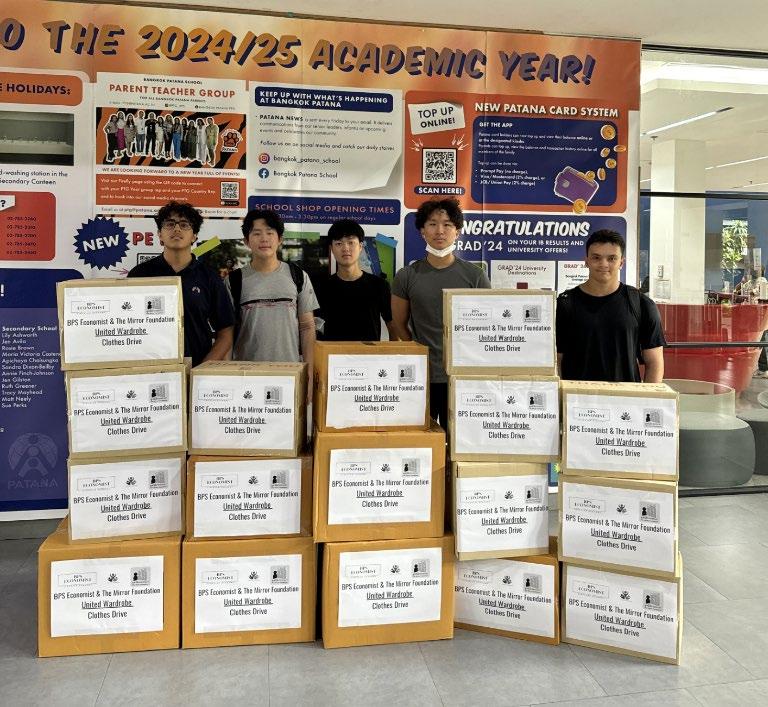
Cindy Adair, Cross Campus Principal
Each month the Student Environmental Committee look around the community for groups making a direct impact on sustainability either here on campus or out in the broader community.
Our November Eco-Heroes are the PTG! The PTG’s recent initiative to breathe new life into lightly used old school uniforms is nothing short of immense. Fast fashion is a real concern due to its impact on the environment and in particular our water-ways, and with young children growing fast, many used uniforms still have plenty of wear left in them. Well done to the whole PTG team for your foresight and for working hard to make this initiative happen. Here are some reflections from Mr Philip Davies on behalf of the PTG:
The PTG clothes recycling team were delighted to donate our stock of used school uniforms to the flood relief appeal in October. We were very grateful for support and guidance of the Foundation Board of the school in making the donation, it made all the difference, thank you! 1,894 items of used uniforms were donated representing clothing for roughly 800 people.
Firstly, we sent everything we had to the appeal without having planned ahead. Images of the flood made it clear that the most useful items were Secondary School polo shirts, dark trousers and skirts. We had not built up a stock of these most useful items for an emergency so we would like to be better prepared next time. We invite Secondary students and families to consider donating their used polo shirts, dark trousers and skirts to the orange collection box-


es outside the Tiger Shop or in the Secondary Canteen area. Used garments may not be in the best condition, but think whether useful they might be to someone in dire need! We will box them up and be more prepared for a future emergency.
Secondly, our entire stock of primary uniforms went to the flood relief. We had been donating uniforms to an orphanage in northern Thailand and there are several other donation projects made through the school. We would like to ask your help in rebuilding our stock of used Primary uniforms. Please see whether your cupboards can be emptied of old garments, and particularly as those grey PE kits as they are phased out. Donate them to an orange collection box. Please include items that may seem worn or in need of repair, the orphanage will find new life for them!
The photographs the orphanage sent us of children wearing donated uniforms are a good reminder of the joy a child can feel in owning a uniform. Each child looks overjoyed and together they look as though a minor miracle has just happened! The quality and design shown of our Primary uniforms in the photographs does seem a little miraculous when they have all been used once.
Our December Eco-Heroes are the Patana Marine Conservation Group or “PMCG” for short. This group are committed to keeping our Oceans clean and preventing single use plastic entering marine habitats. Currently the group are designing an artificial reef for installation in the waters off Pattaya. The group participate in beach and reef clean-ups on a regular basis. Keep up the good work!

At Bangkok Patana School we welcome parents on to our campus. As part of this agreement, all parents must agree to our Parents’ Safeguarding Code of Conduct. This includes:
1. Never taking images in toilets, changing rooms or areas where privacy is expected.
2. Using judgement before taking and before sharing images of students.
During a regular school day, parents may only take images of their own child – unless they have sought and received permission from another family to include their child in a group photo. Family employees with access to the campus must also abide by this rule.
The following information clarifies where and when parents can take images on campus.

(No outside photographers allowed)
(No outside photographers allowed)
(No outside photographers allowed)
(No outside photographers allowed)
(No outside photographers allowed)
Alis Gorcea, EAL Teacher
On 8th November, Bangkok Patana School welcomed over 50 ELL specialists from across Bangkok for a dynamic teachers-teaching-teachers professional meet centered on the theme Scaffolding in the Co-Taught Classroom.
Participants gathered in small groups for engaging round-table sessions designed to foster dialogue about differentiation and scaffolding in the classroom. Rather than having a single facilitator, these sessions were an opportunity for teachers to exchange, discuss, and brainstorm together. Each teacher contributed an example, strategy, activity, research finding, or article relevant to the theme. This way teachers got to tap into a collective expertise, and everyone left with fresh perspectives and actionable strategies to enhance their work with English Language Learners.
A second round of discussions continued in this collab-



orative spirit, organised into thematic groups that encouraged exploration and shared problem-solving. The five topics addressed were:
1. Innovative AI Tools in Language Learning
2. Progress Monitoring and Effective Data Use
3. Effective Co-Teaching Strategies
4. Translanguaging as a Learning Tool
5. Entrance and Exit Criteria for Language Support Programs
These sessions created a think-tank environment where participants shared insights, posed questions, and built upon one another’s ideas.
This professional meet showcased the power of collaboration, reinforcing the value of collective learning to support and inspire educators in their mission to empower English Language Learners.
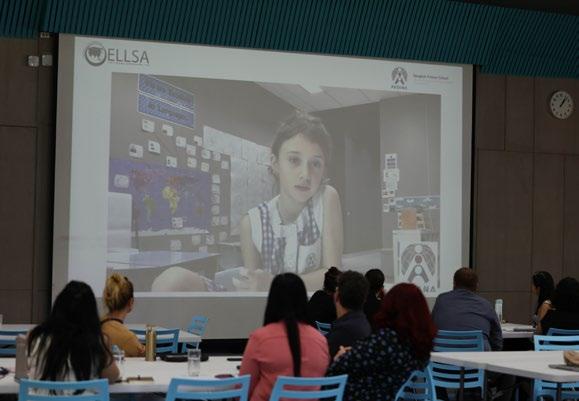


As dedicated advocates for the power of play in education, Bangkok Patana School was delighted to host the Primary Play Network, a collaborative event where innovative educators from across the city gathered to share best practise. The event highlighted the significant impact play has on the development of young learners and provided a forum for meaningful dialogue among educators passionate about empowering students to take ownership of their learning journey and develop a lifelong love for exploration and discovery.
Through interactive workshops and engaging discussion, participants explored the transformative role of play in enhancing social, emotional, and cognitive development. They reflected on the importance of high-quality play provision, discussing how play opportunities can be made progressively challenging for all children and how to communicate the value of play effectively to the school community.
Participants also enjoyed engaging in child-led play and playful learning with Year 1 students, observing the children’s ability to communicate ideas, connect with prior learning, and deepen their understanding of the world around them. They further explored play in practice at Patana, gaining insights into how professional development initiatives in Foundation Stage and Key Stage 1 have positively impacted children’s progress across the curriculum.
The Primary Play Network event was an inspiring reminder of the power of play in education. By fostering collaboration and sharing best practice, educators left with renewed enthusiasm and insights to enrich the learning experiences of their students, ensuring that play remains at the heart of every child’s educational journey.


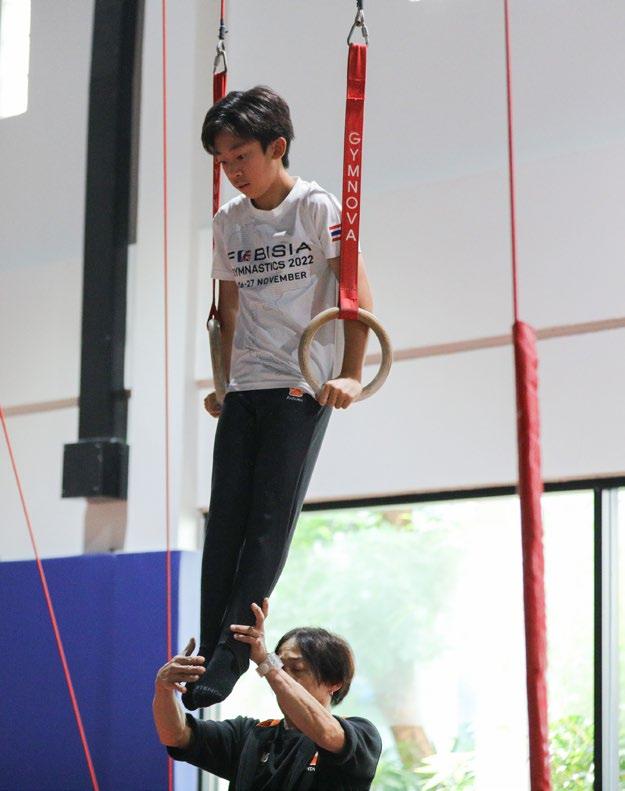
As the Head of Sport at Bangkok Patana School, I am thrilled to reflect on the many exciting sporting events our students have participated in so far this academic year. Our commitment to excellence in athletics continues to shine through as we compete against peers and showcase our talents.
This year, we kicked off our sporting calendar with impressive performances in the newly formed Bangkok Community Cup, where our Football and Volleyball teams demonstrated exceptional skill and teamwork. All teams competed fiercely, with our Girls’ Football and Girls’ Volleyball teams being crowned champions!
The annual Fun Run at Rama 9 Park brought our community together, encouraging students, staff, and families to engage in physical activity while enjoying the supportive environment of our school. The day was filled with vibrant energy, emphasising the importance of health and wellness as well as showing we could all go that extra mile…. or two!!
Our Dance Fest showcased the creativity and dedication of our performers. Students of all ages energised the stage with their dynamic choreography and passionate
performances, celebrating the power of dance to unite and inspire.
The Voyager Tennis Academy Weekend was a fantastic opportunity for our tennis players. Our friends from Singapore travelled across to play in our new state of the art Tennis facility to compete in friendly matches, allowing our Tennis players to enhance their skills and build camaraderie with fellow athletes.
Our participation in the JV BMAC Football and Volleyball events saw our athletes shine, competing with determination and showcasing their sportsmanship. As the season progressed, our basketball teams also demonstrated their prowess at the BMAC U14 and U12 Basketball tournaments, with players gaining invaluable experience on the court.
In Football, our BMAC U11 team and the SEASAC tournaments became key highlights. The SEASAC Football, hosted at BPS, welcomed teams from across the region, allowing our players to shine in front of our home crowd. Meanwhile, our SEASAC Volleyball teams traveled to Singapore for the girls’ competition and Vietnam for the boys, where they represented our school with pride.
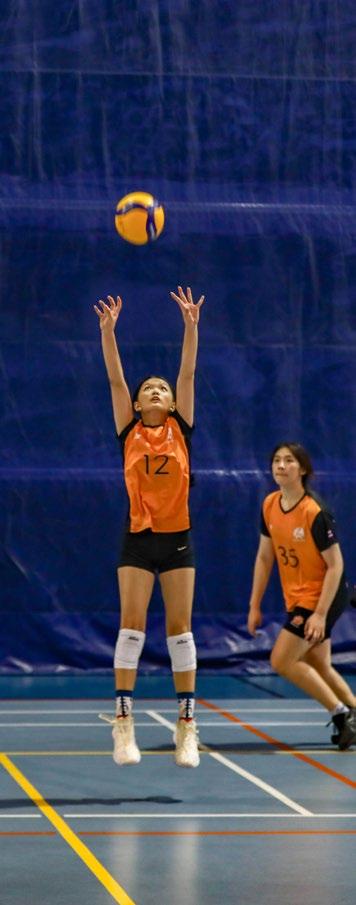

Our young rugby players showcased their skills at the RBSC 10’s U11 Rugby, while the FOBISIA U18 Netball tournament in Singapore allowed our netball team to gain competitive experience against strong opponents.
Participation in the BIS Phuket Football 7’s tested our players’ skills and teamwork, while Golf and Cross-country competitors excelled at the SEASAC events in Kuala Lumpur.
This coming weekend we have the FOBISIA Gymnastics event in Jakarta which will no doubt highlight our Gymnasts talent and dedication, while on home turf we are hosting the Feeding Frenzy. This is always a monster event involving schools from all around the region so I wish everyone the best of luck.
These events are just a snapshot of the many stellar performances and achievements of our athletes. I extend my gratitude to coaches, staff, and families for their unwavering support, which plays a crucial role in our students’ success. I would like to wish the entire Bangkok Patana School community a Merry Christmas! Enjoy a restful break filled

with joy and laughter. I look forward to seeing everyone return rejuvenated and ready for an exciting year ahead, packed with sports action and unforgettable moments! Happy holidays!
Notable mentions:
U12 Boys Basketball BMAC Champions
U12 Girls Basketball BMAC Champions
U14 Girls Tennis BMAC Champions
JV Boys Football BMAC Champions
JV Girls Football BMAC Champions
BMAC Swimming Winter Championships Overall Winners
Congratulations to Rattanachai Phangsa for his incredible achievement at the SACIT (Sustainable Arts and Crafts Institute of Thailand) ‘Identity of Siam 15’ Art Fair, held at the Queen Sirikit National Convention Centre. Khun Rat was honoured with the prestigious ‘Legend of Thai Craft’ award as a ‘New Artist’ in 2024.
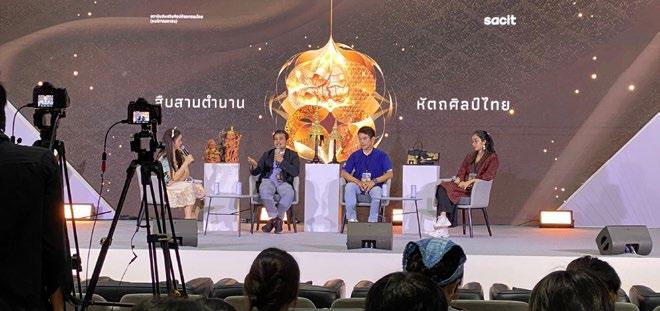

Ananjana Srivorakul, Parent
Caden, 7M and Kayla, 7B achieved incredible success in Thailand’s first “Youth Ballers League,” which launched in September 2024. Competing in weekend tournaments and attending late-night practices, Caden played for the ‘Siam Ravens’ and Kayla for the ‘Siam Slammers.’
In the finals last weekend, the Siam Ravens emerged as champions, with Caden earning the MIP (Most Improved Player) award for his remarkable progress. Kayla was selected for the All-Star team (West side), and her team also celebrated victory.














